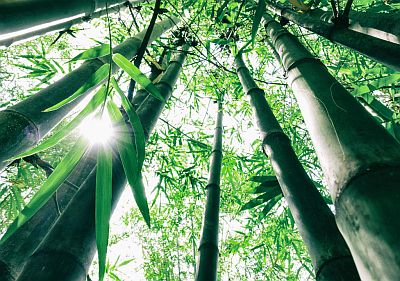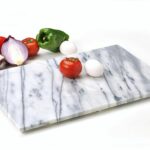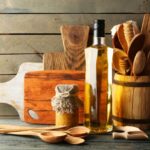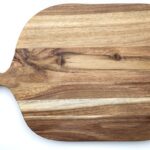Every chef needs a great cutting board. A durable cutting board is the cornerstone of all kitchen prep work. And without this prep work, we can’t enjoy all the delicious, fragrant meals that make our mouths water.
So it’s no wonder that anyone who is passionate about cooking (professionally or as a home cook) is looking for the perfect cutting board. But as many of us quickly discover, choosing the perfect model is no easy task.
Kitchen cutting boards come in different widths and sizes. However, we usually distinguish them according to the material they are made of. Cutting boards can be made of wood, plastic, glass, marble, silicone, or granite. Recently, bamboo cutting boards have become increasingly popular as people discover their benefits.
Since everyone’s been raving about bamboo lately, we wondered if bamboo cutting boards were the answer to every cook’s favorite question and looked into it.

What Are the Advantages of Bamboo Cutting Boards?
Compared to other cutting boards bamboo cutting boards have several advantages over their counterparts made of glass, wood, or plastic:
1. Bamboo cutting boards look attractive
Perhaps not the main advantage of bamboo cutting boards, but their aesthetically pleasing appearance is still worth mentioning. Bamboo is naturally light and has an even, fine grain. Thanks to the durability of bamboo, the smooth and smooth surface remains for a long time.
A bamboo board gives your kitchen a clean and elegant look and fits well into any kitchen decor. You can use it on your dining table as a serving board.
Bamboo is technically a grass, but it is also water-resistant. This means that the cutting board does not have water or food stains.
2. Bamboo is a durable material
Bamboo is 15-19% denser than wood. This means, on average, your knives will leave 15-19% fewer ridges and marks on the cutting board. It stays smooth longer than most wooden cutting boards and doesn’t crack or warp as quickly as other boards.
Bamboo can take a lot of what you need in a cutting board. Because it is harder and more durable than wood and yet lighter, it is almost perfect as a material for cutting boards.
3. Bamboo is hygienic
Fewer burrs and marks also mean fewer bacteria. Bacteria often get into our cutting boards and can contaminate our food if we don’t handle them properly. Plastic cutting boards can be easily damaged by cutting, giving microbes the best chance to grow. With bamboo cutting boards we don’t have to worry so much because bamboo offers specific antibacterial properties.
Bamboo is naturally antibacterial, which means the cutting board does some of the cleaning for you. The antimicrobial properties of bamboo kill bacteria, making your work much easier.
4. Bamboo utensils are eco-friendly
Those who try to be as eco-friendly as possible will be happy to know that bamboo is the perfect choice because it is renewable. It is a fast-growing grass that regenerates quickly and easily
Unlike marble and hardwoods like maple or oak, which take years to grow, bamboo grows quickly. In addition, harvesting is easy, so it does not require a lot of labor. Talk about an eco-friendly product!
5. Bamboo cutting boards are easy to use
Because bamboo is so light, bamboo cutting boards are easy to use. If your cooking station is busy, you won’t sing the praises of a marble cutting board that requires at least two hands to move.
Because bamboo is durable and hard, the cutting boards don’t need to be as thick as wood or marble. So storing, moving and washing is not a chore.
What Are the Disadvantages of Bamboo Cutting Boards?
Since there is no perfect material, it is only logical to assume that bamboo cutting boards have some disadvantages.
1. Bamboo cutting boards aren’t knife-friendly
We have already mentioned that bamboo is denser than wood. But this also means that it is harder on the knives. When we cut vegetables, the edge of our blades can fold over on a bamboo cutting board. This is especially true if we do not have professional knives made of hard steel.
Additionally, bamboo is harder than wood but not as durable. Between the knots, it is much softer than wood. This causes uneven wear on the knives and can even cause the blade edges to tear. In addition, bamboo has a high proportion of silica. Silica quickly dulls knife blades. So when we use a bamboo cutting board, we have to take much more care of our knives and sharpen them regularly.
2. Bamboo cutting boards aren’t dishwasher-safe
Bamboo is hygienic but does not tolerate high heat very well. High heat will cause any cutting board to crack and warp. Since bamboo cutting boards are quite thin, they probably won’t survive the dishwasher in one piece.
For the same reason, these beauties can’t double as a hotplate either. The high heat from our pots and pans can leave our boards in terrible shape or at least warped.
3. Bamboo cutting boards require maintenance
Although bamboo cutting boards require more attention than just simple cleaning, they are not particularly demanding. We should use mineral oil or beeswax at least once a month to prevent the board from cracking. We can also use a special bamboo cutting board oil. Both options are quite affordable (as is the board itself) and maintenance only takes a few minutes.
Therefore, bamboo falls into the “non-requiring” category when it comes to preservation and care. Still, they require more care than other cutting boards, such as marble, which only requires cleaning.
4. They might have potentially toxic adhesive
When manufacturers make bamboo cutting boards, they need to tie the bamboo together. This creates the inconsistency we already talked about. The glue that manufacturers use to bind bamboo together can sometimes be toxic. Therefore, if you do not check the composition of the glue, the hygienic properties of bamboo can be lost. The best choice is cutting boards with formaldehyde-free glue.
Related products:
- ROYAL CRAFT WOOD Extra Large Cutting Boards for Kitchen Meal Prep & Serving
- Bamboo Cutting Boards for Kitchen, (Set of 3) by Kikcoin (with deep grooves on each side and the hole easy storage)
Final Words
Having a bamboo cutting board in your kitchen can only be a good thing, especially if you chop a lot of vegetables. If you take good care of your bamboo cutting board, it can last for several decades without many ridges and stains. Not too shabby for such an affordable product, right?




More and more people these days are choosing to use bamboo cutting boards over boards that are made from plastic, glass, or maple. Wooden cutting boards are much more attractive and hygienic than those made from other materials, however, it takes full tree years to grow. Choosing to use eco-sensitive bamboo cutting boards, however, seems to be a sound ecological alternative to using wooden boards.
I love using the bamboo cutting board. Do you think that we can use some coconut oil to maintain the beauty and strength of it?
Is there some evidence that vinegar is effective in cleaning boards after raw meat has been there?